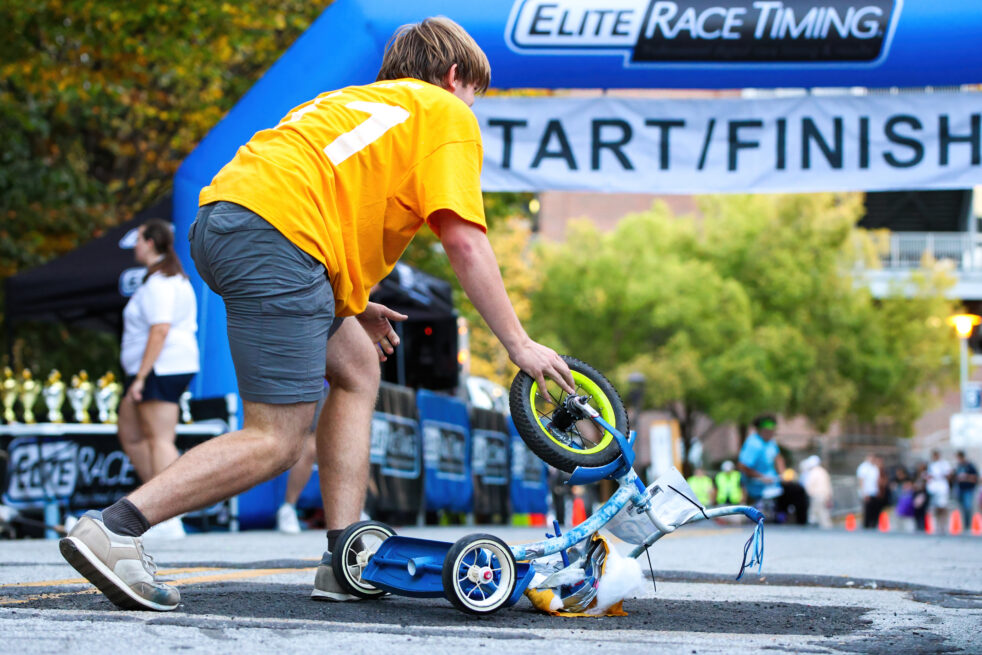On Thursday, Oct. 26, Judge SteOn Friday Oct. 27, the 54th annual Mini 500 tricycle race occurred — a part of the weekend-long festivities that make up Tech’s homecoming traditions. The eight-lap competition in which student teams design their own tricycle consistently showcases the creativity, passion and engineering prowess of the student body. However, one trending practice poses a threat to its existence.
Colloquially referred to as, “trike spiking,” the action involves lifting a tricycle above one’s head and smashing it on the ground or against a wall in an attempt to destroy it. As the organizers of the Mini 500, the Ramblin’ Reck Club voiced their concerns about the liability issues related to the practice in an interview with the Technique.
“This year, a third of the teams that competed were disqualified,” said Aastha Singh, second-year ME and one of the two Mini 500 sub chairs within the Ramblin’ Reck Club’s homecoming committee. “Some teams were disqualified for not having trikes up to regulations, having people on the race track that were not supposed to be there or having vehicles on the race track that were not supposed to be there.”
However, Singh said that trike spiking was the main cause for disqualifications this year, noting that “a disproportionate number of [Interfraternity Council] IFC teams or IFC proxy teams are spiking trikes.”
The rule against trike spiking carries a heavy punishment, as teams receive a two year disqualification from the race for the rule violation. However, groups seem to be willing to take this punishment as the number of spiked trikes per year continues to grow. Ramblin’ Reck Club’s Homecoming Chair Bethany McMorris, fifth-year CS, discouraged this act, saying “spiking a trike has gone back for many, many years, but it is especially dangerous.”
Ramblin’ Reck Club President Joshua Fernandes, fifth-year CS, echoed McMorris’ statement, saying that the act “is dangerous to other people as they might be hit by a piece of shrapnel from the smashed trike. It also may damage the road or injure spectators in the process.”
Ramblin’ Reck Club does take preventative measures to ensure the safety of all the event’s attendees, with Singh saying that Georgia Tech Police Department (GTPD), course monitors and pit bosses ensure rules are followed and everyone is safe. However, an incident this year has highlighted that even these preventative measures do not necessarily equate to ensuring all rules are followed. A College Panhellenic Council (CPC) affiliated group spiked their tricycle as a result of encouragement to do so from what appeared to be an officer of GTPD.
“The officer that encouraged this was a Tech alum and is actually not a part of GTPD,” McMorris said. “He is a citizen that volunteers with GTPD often. With his actions, he was reprimanded and was told about the dangers and that he would not be invited to the event in future years.”
Tech students revere the Mini 500 for its competitive nature, but going so far as to spike one’s trike could have dangerous repercussions. The homecoming committee clarified that even one injury related to trike spiking could result in the event’s permanent cancellation.
“[Ramblin’ Reck Club] gets it, we are college students. We know what peer pressure means. When 50 or 100 people are yelling ‘spike the trike,’ we understand it, but it is important to realize this is a timelong tradition. Everyone at Tech loves the Mini 500 and all it takes is one incident or one thing to go wrong, and the whole event disappears, We don’t [enforce these rules] because we dislike people having fun or because we have a stick up our butt, we do this because we care about traditions and in order to protect these traditions we need to have rules and ensure everyone is safe,” said Fernandes.
Many Ramblin’ Reck Club members offered alternative means for students to express their competitive spirit during the event that would not endanger others.
“We like teams to celebrate by running their last lap together which is a great time for encouragement and comradery, and we often see the teams lift up their trikes in celebration at the finish line and there’s nothing wrong with this as long as you place it back down gently on the ground,” said Austin Reitano, fourth-year PUBP and BA and Ramblin’ Reck Club Vice President.
Ajay Mathur, fourth-year ME and the other Mini 500 subchair on Ramblin’ Reck Club’s homecoming committee, spoke on a unique experience some of this year’s teams had.
“Four teams had the opportunity to see their trikes race on ACC Network [this year]. An awesome opportunity, and one they would not have gotten if they had spiked their trike in several pieces,” said Mathur.
Environmental factors like the large crowds, peer pressure and competitive energy at the Mini 500 have pushed more students each year to spike their trikes. Though it may seem harmless, trike spiking poses risks to participants, spectators and the tradition as a whole.
The event is a healthy competition among students, and the tradition will continue to live on as long as students compete within the bounds of the rules.
